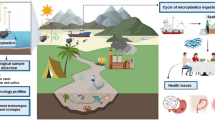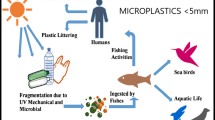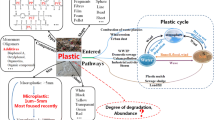Abstract
The increasing use of polypropylene (PP) in consumer products leads to the microplastic (PP MPs) contamination of the aquatic ecosystems. Comprehensive toxicological studies of weathered/aged and new PP MPs with Artemia salina are a need of the hour. Our study explores the toxicological differences between naturally weathered (aged) and prepared new PP MPs on Artemia salina. Both the weathered and new PP MPs were prepared using controlled grinding and sieving at ≤ 125 µm. Artemia salina was treated with different concentrations (0.25, 0.5, and 1 mg/mL) of PP MP particles for up to 48 h. The uptake of weathered PP MP particles by Artemia salina was higher than the new PP MPs. The accumulation of PP MP particles was found in the intestine. There was increased oxidative stress recorded in the animal treated with the weathered PP MPs than the new PP MPs. Artemia salina treated with weathered PP MPs showed higher ROS generation and increased, activity of oxidative enzymes like LPO, SOD, and CAT. Collectively, our findings underscore the detrimental effects of weathered and prepared new PP MPs on Artemia salina, which is an ecologically significant species of zooplankton. There is an urgent need and effective measures required to address plastic disposal strategies in an environmentally safe manner.





Similar content being viewed by others
Data availability
The datasets used and/or analyzed during the current study are available from the corresponding author on reasonable request.
Abbreviations
- PP MPs:
-
Polypropylene microplastics
- NSW:
-
Natural sea water
- ROS:
-
Reactive oxygen species
- LPO:
-
Lipid peroxidation
- SOD:
-
Superoxide dismutase
- CAT:
-
Catalase
- TBA:
-
Thiobarbituric acid
- TCA:
-
Trichloroacetic acid
- MDA:
-
Malondialdehyde
- DCFH-DA:
-
2′,7′-Dichlorofluorescin diacetate
- Na2CO3 :
-
Sodium carbonate
- NBT:
-
Nitroblue tetrazolium chloride
- H2O2 :
-
Hydrogen peroxide
References
Alimba CG, Faggio C (2019) Microplastics in the marine environment: current trends in environmental pollution and mechanisms of toxicological profile. Environ Toxicol Pharmacol 68:61–74. https://doi.org/10.1016/j.etap.2019.03.001
Anil Athulya P, Sunil Z, Manzo S et al (2023) Prepared microplastics interaction with Artemia salina under low pH conditions representing ocean acidification; a simulated environmental exposure Energy and Sustainable Economic Development Title page. J Environ Manage 348:119367. https://doi.org/10.1016/j.jenvman.2023.119367
Arulvasu C, Jennifer SM, Prabhu D, Chandhirasekar D (2014) Toxicity effect of silver nanoparticles in brine shrimp Artemia. Sci World J 2014:1–10. https://doi.org/10.1155/2014/256919
Ates M, Daniels J, Arslan Z, Farah IO (2013) Effects of aqueous suspensions of titanium dioxide nanoparticles on Artemia salina: assessment of nanoparticle aggregation, accumulation, and toxicity. Environ Monit Assess 185:3339–3348. https://doi.org/10.1007/s10661-012-2794-7
Bakhtiyar Y, Arafat MY, Andrabi S, Tak HI (2020) Zooplankton: the significant ecosystem service provider in aquatic environment. Bioremediation and biotechnology, vol 3. Springer International Publishing, Cham, pp 227–244
Barhoumi B, Metian M, Zaghden H et al (2023) Microplastic-sorbed persistent organic pollutants in coastal Mediterranean Sea areas of Tunisia. Environ Sci Process Impacts. https://doi.org/10.1039/D3EM00169E
Bobori DC, Feidantsis K, Dimitriadi A et al (2022) Dose-dependent cytotoxicity of polypropylene microplastics (PP-MPs) in two freshwater fishes. Int J Mol Sci 23:13878. https://doi.org/10.3390/ijms232213878
Bour A, Hossain S, Taylor M et al (2020) Synthetic microfiber and microbead exposure and retention time in model aquatic species under different exposure scenarios. Front Environ Sci 8:1–10. https://doi.org/10.3389/fenvs.2020.00083
Bradford MM (1976) A rapid and sensitive method for the quantitation of microgram quantities of protein utilizing the principle of protein-dye binding. Anal Biochem 72:248–254. https://doi.org/10.1016/0003-2697(76)90527-3
da Silva RM, Miguel TBAR, de Castro Miguel E et al (2022) Protective effect of ultrasound-processed Amazonian sapota-do-solimões (Quararibea cordata) juice on Artemia salina Nauplii. Processes 10. https://doi.org/10.3390/pr10091880
Das Pramanik D, Lei S, Kay P, Goycoolea FM (2023) Investigating on the toxicity and bio-magnification potential of synthetic glitters on Artemia salina. Mar Pollut Bull 190:114828. https://doi.org/10.1016/j.marpolbul.2023.114828
Dey P, Bradley TM, Boymelgreen A (2023) The impact of selected abiotic factors on Artemia hatching process through real-time observation of oxygen changes in a microfluidic platform. Sci Rep 13:1–12. https://doi.org/10.1038/s41598-023-32873-1
Eom H-J, Nam S-E, Rhee J-S (2020) Polystyrene microplastics induce mortality through acute cell stress and inhibition of cholinergic activity in a brine shrimp. Mol Cell Toxicol 16:233–243. https://doi.org/10.1007/s13273-020-00088-4
Gambardella C, Morgana S, Ferrando S et al (2017) Effects of polystyrene microbeads in marine planktonic crustaceans. Ecotoxicol Environ Saf 145:250–257. https://doi.org/10.1016/j.ecoenv.2017.07.036
Hadiyanto H, Khoironi A, Dianratri I et al (2021) Interactions between polyethylene and polypropylene microplastics and Spirulina sp. microalgae in aquatic systems. Heliyon 7:e07676. https://doi.org/10.1016/j.heliyon.2021.e07676
Han X, Zheng Y, Dai C et al (2021) Effect of polystyrene microplastics and temperature on growth, intestinal histology and immune responses of brine shrimp Artemia franciscana. J Oceanol Limnol 39:979–988. https://doi.org/10.1007/s00343-020-0118-2
Jemec A, Tišler T, Drobne D et al (2008) Biochemical biomarkers in chronically metal-stressed daphnids. Comp Biochem Physiol Part C Toxicol Pharmacol 147:61–68. https://doi.org/10.1016/j.cbpc.2007.07.006
JemecKokalj A, Dolar A, Drobne D et al (2022) Environmental hazard of polypropylene microplastics from disposable medical masks: acute toxicity towards Daphnia magna and current knowledge on other polypropylene microplastics. Microplast Nanoplast 2:1–15. https://doi.org/10.1186/s43591-021-00020-0
Jeyavani J, Sibiya A, Bhavaniramya S et al (2022a) Chemosphere toxicity evaluation of polypropylene microplastic on marine microcrustacean Artemia salina: an analysis of implications and vulnerability. Chemosphere 296:133990. https://doi.org/10.1016/j.chemosphere.2022.133990
Jeyavani J, Sibiya A, Bhavaniramya S et al (2022b) Toxicity evaluation of polypropylene microplastic on marine microcrustacean Artemia salina: an analysis of implications and vulnerability. Chemosphere 296:133990. https://doi.org/10.1016/j.chemosphere.2022.133990
Jeyavani J, Sibiya A, Stalin T et al (2023) Biochemical, genotoxic and histological implications of polypropylene microplastics on freshwater fish Oreochromis mossambicus: an aquatic eco-toxicological assessment. Toxics 11. https://doi.org/10.3390/toxics11030282
Jung MR, Horgen FD, Orski SV et al (2018) Validation of ATR FT-IR to identify polymers of plastic marine debris, including those ingested by marine organisms. Mar Pollut Bull 127:704–716. https://doi.org/10.1016/j.marpolbul.2017.12.061
Kono Y (1978) Generation of superoxide radical during autoxidation of hydroxylamine and an assay for superoxide dismutase. Arch Biochem Biophys 186:189–195. https://doi.org/10.1016/0003-9861(78)90479-4
Larue C, Sarret G, Castillo-Michel H, Pradas del Real AE (2021) A critical review on the impacts of nanoplastics and microplastics on aquatic and terrestrial photosynthetic organisms. Small 17. https://doi.org/10.1002/smll.202005834
Law KL, Thompson RC (2014) Microplastics in the seas. Science 345(80):144–145. https://doi.org/10.1126/science.1254065
Madhav MR, David SEM, Kumar RSS et al (2017) Toxicity and accumulation of copper oxide (CuO) nanoparticles in different life stages of Artemia salina. Environ Toxicol Pharmacol. https://doi.org/10.1016/j.etap.2017.03.013
Ñañez Pacheco GK, Sanabio Maldonado NS, Pastrana Alta RY, Aguilar Vitorino H (2021) Short exposure of Artemia salina to group-12 metals: comparing hatchability, mortality, lipid peroxidation, and swimming speed. Ecotoxicol Environ Saf 213. https://doi.org/10.1016/j.ecoenv.2021.112052
Peixoto D, Torreblanca A, Pereira S et al (2022) Effect of short-term exposure to fluorescent red polymer microspheres on Artemia franciscana nauplii and juveniles. Environ Sci Pollut Res 29:6080–6092. https://doi.org/10.1007/s11356-021-15992-y
Saha G, Chandrasekaran N (2023) Isolation and characterization of microplastics from skin care products; interactions with albumin proteins and in-vivo toxicity studies on Artemia salina. Environ Toxicol Pharmacol 99:104112. https://doi.org/10.1016/j.etap.2023.104112
Schiavo S, Oliviero M, Li J, Manzo S (2018) Testing ZnO nanoparticle ecotoxicity: linking time variable exposure to effects on different marine model organisms. Environ Sci Pollut Res 25:4871–4880. https://doi.org/10.1007/s11356-017-0815-3
Schiavo S, Oliviero M, Chiavarini S et al (2021) Polyethylene, polystyrene, and polypropylene leachate impact upon marine microalgae Dunaliella tertiolecta. J Toxicol Environ Heal - Part A Curr Issues 84:249–260. https://doi.org/10.1080/15287394.2020.1860173
Serrão C, Marques-Santos LF (2023) The genus Artemia, the nanoplastics, the microplastics, and their toxic effects: a review. Environ Sci Pollut Res 30:83025–83050. https://doi.org/10.1007/s11356-023-27868-4
Setälä O, Lehtiniemi M, Coppock R, Cole M (2018) Microplastics in marine food webs. In: Microplastic contamination in aquatic environments. Elsevier, pp 339–363
Thiagarajan V, Seenivasan R, Jenkins D et al (2020) Combined effects of nano-TiO2 and hexavalent chromium towards marine crustacean Artemia salina. Aquat Toxicol 105541. https://doi.org/10.1016/j.aquatox.2020.105541
Viega BL, Rocha AM, Düsman E (2020) Cosmetics with hormonal composition for bioindicators Artemia salina L. and Allium cepa L. toxic potential. Environ Sci Pollut Res 27:6659–6666. https://doi.org/10.1007/s11356-019-07392-0
Wagner J, Wang Z-M, Ghosal S et al (2017) Novel method for the extraction and identification of microplastics in ocean trawl and fish gut matrices. Anal Methods 9:1479–1490. https://doi.org/10.1039/C6AY02396G
Wang H, Joseph JA (1999) Quantifying cellular oxidative stress by dichlorofluorescein assay using microplate reader1, 1 Mention of a trade name, proprietary product, or specific equipment does not constitute a guarantee by the United States Department of Agriculture and does not imp. Free Radic Biol Med 27:612–616. https://doi.org/10.1016/S0891-5849(99)00107-0
Xia Y, Zhou J-J, Gong Y-Y et al (2020) Strong influence of surfactants on virgin hydrophobic microplastics adsorbing ionic organic pollutants. Environ Pollut 265:115061. https://doi.org/10.1016/j.envpol.2020.115061
Zhang Q, Zhu L, Wang J et al (2013) Oxidative stress and lipid peroxidation in the earthworm Eisenia fetida induced by low doses of fomesafen. Environ Sci Pollut Res 20:201–208. https://doi.org/10.1007/s11356-012-0962-5
Funding
The authors express their gratitude to the Indian Council of Medical Research (ICMR) for providing financial support through Grant-F⋅No. 36/2/2020/Toxi/ BMS.
Author information
Authors and Affiliations
Contributions
SK: methodology, investigation, formal analysis, data curation, validation; RS: resources; AM: project administration, funding acquisition; NC: conceptualization, idea behind the whole manuscript, drafting, review and editing, methodology, supervision.
Corresponding author
Ethics declarations
Ethics approval
Not applicable.
Consent to participate
Not applicable.
Consent for publication
Not applicable.
Competing interest
The authors declare no competing interests.
Additional information
Responsible Editor: Philippe Garrigues
Publisher's Note
Springer Nature remains neutral with regard to jurisdictional claims in published maps and institutional affiliations.
Rights and permissions
Springer Nature or its licensor (e.g. a society or other partner) holds exclusive rights to this article under a publishing agreement with the author(s) or other rightsholder(s); author self-archiving of the accepted manuscript version of this article is solely governed by the terms of such publishing agreement and applicable law.
About this article
Cite this article
Kanimozhi, S., Seenivasan, R., Mukherjee, A. et al. Naturally weathered polypropylene microplastic from environment and its toxic behaviour in Artemia salina. Environ Sci Pollut Res 31, 13207–13217 (2024). https://doi.org/10.1007/s11356-024-31998-8
Received:
Accepted:
Published:
Issue Date:
DOI: https://doi.org/10.1007/s11356-024-31998-8




